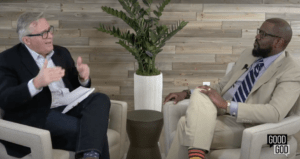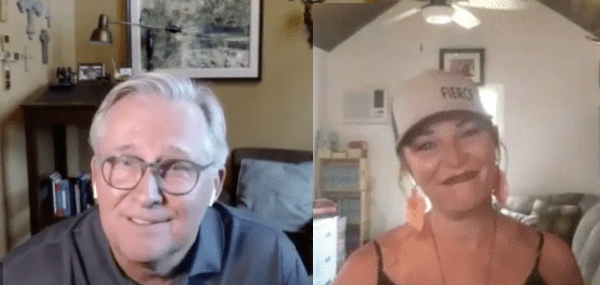George Mason describes his “Good God” podcast as a way to connect the dots between religion and just about everything else.
“It’s educating, inspiring and creating civil discourse. It’s helping people bridge faith and public life,” said Mason, senior pastor at Wilshire Baptist Church in Dallas.
Since its launch in 2018, the podcast has taken deep dives into preaching, art, the #MeToo movement, white fundamentalism, Christian nationalism, women in ministry, hunger and interfaith dialogue among others in more than 130 episodes.

Prior to COVID, George Mason interviews Allen Brooks in the “Good God” studio at Wilshire Baptist Church.
The “God God” audio sessions — which also are videotaped and posted to YouTube and Facebook — feature one-on-one conversations between Mason and guests who have included such notables as Tony Campolo, Jen Hatmaker, Robert P. Jones, Amy Butler, Diana Butler Bass, Rabbi David Stern and Muslim civil rights leader Omar Suleiman.
“I try to make them conversations, not just interviews,” Mason said. “I comment, as well, not just ask questions. I am hoping to reach people far and wide — people who are not going to come to church.”
Mason spoke with Baptist News Global about his podcast and how it fits into his ministry and calling.
What inspired you to create a podcast?
Someone talked me into it. A man in our church who has a background in radio and was developing his own podcast. He was talking with a startup that wanted to promote podcasts. And he had all the equipment to do it and he thought I would be a natural to have conversations about faith and matters of public life. So, I got to thinking about it and agreed that he would produce it and I would create the “Good God” podcast.
“I wanted something that would combine faith and religion with the common good.”
How did you come up with the title?
I wanted something that would combine faith and religion with the common good. I wanted something that would be a little bit catchy. And I wanted something that would not be specifically Christian because I wanted the podcast to have a multi-faith emphasis. I wanted to be able to talk to people of all faiths and of no faith, and for it to be a podcast that explored with people the connection with their own personal spiritual life and the work they do in the world for good. “Good God” combines God with the common good.
How does the podcast enhance or overlap with your ministry at Wilshire?
In the early days of the podcast, since it was not a church ministry but a production of a nonprofit I started called Faith Commons, I made sure that everything I was doing was separate from the church. But over time I think the church became comfortable with a closer link, including moving the studio to the church.
Functionally, was there a precedent equivalent to the podcast for preachers? Maybe writing books?
Possibly it may have been pastors who had radio programs long, long ago. I suppose there are still some today. Sometimes, preachers would have their own radio programs that weren’t productions of the church. It was their own ministry, if you will.
How is the podcast different in 2020 than it was when launched in 2018?
Generally, it is about the same length — 30 minutes — because most people commute 15 minutes to an hour. I want them to be able to listen while they are commuting or exercising. Going beyond that is asking a lot.
The biggest difference has come about due to COVID. In 2018 and until the pandemic, I was in a studio sitting next to a guest and it filmed and recorded that way. But without the ability to be in person, we have gone to Zoom.
“The nice thing about the Zoom dimension is it has allowed us to move beyond the local.”
The video is posted on YouTube and Facebook with links to Twitter. Everything is available at goodgodproject.com. The nice thing about the Zoom dimension is it has allowed us to move beyond the local. I don’t have to wait for someone to come to town to have those conversations.
Will you go back to in-person when it’s safe to do so?
I imagine both. I imagine the format will change depending on where that guest is. Without a doubt we’ll continue to use the Zoom format for some podcasts.
Has the focus of the podcast evolved since 2018?
Initially. I simply wanted a diversity of guests from different faiths. But over time I have realized there are some themes that are recurring. For instance, this summer I did a series on race because of the George Floyd circumstances, and Breonna Taylor. I realized I had quite a number of episodes I had recorded and run on race, so we grouped those into a summer series and I added a fresh episode or two. I also added a bonus episode on Robert Jones’ book, White Too Long.
I am now in the recording process with a series on poverty, with others planned on religious liberty and interfaith relationships. I’m starting to move more into this thematic approach to the podcast.
Is it fun?
Oh, heck yeah. I love good, deep conversations and I love to connect my discipline of religion and theology to the work other people are doing to topics of interests around the world. We may cover health care, religious liberty, sports, entertainment — wow, that is a kick.
Do you get a good sense of how your guests experience the podcast?
A lot of the people I talk with see this as something important to the work they’re doing. They will do the podcast and put it on their websites or promote it through social media because it’s them talking about their work. Incidentally, I’ve never paid for a guest. They all do it for free.
You speak of moving from an exasperated “good God” to “good God” as an affirmation. What do you mean by that?
The phrase is used in different ways. We can say it as if to throw our hands up. That’s when we are exasperated and say, “Oh, good God!” It can come from frustration and from whether God is good or if God is involved in our world in positive ways.
In the podcast, the hope is to move from that perplexed, exasperated phrase to an exploration of the question of what is God up to in our world and how we can affirm the goodness of God. We hope we are able to determine that God is, as the title suggests a “Good God.”
Related articles:
Are podcasts replacing church for some believers?
In this election season, I am partisan to the gospel first and last | George Mason

